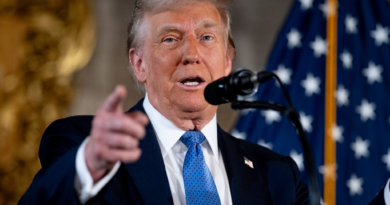Big Tech’s abuse of the patent system must end—take it from me, I’ve fought Google over IP for years
Big Tech firms are stealing technology from small businesses. Congress must stop them.
As the founder and CEO of Netlist, a small company that develops advanced semiconductor technologies, I believed that patenting our inventions would protect our discoveries from bigger companies in our field and help us compete against them. For a time, that’s exactly what happened.
Starting in the mid-2000s, we were granted more than 100 patents on cutting-edge memory technologies, some of which are used today in artificial intelligence computing. It wasn’t long before Netlist’s memory modules became vital components in the world’s most advanced computing systems. We became a key supplier of high-performance memory systems to Dell, IBM, HP, and Google.
Patent theft
But then, the patent theft started. Not by Dell, IBM, or HP—all tech companies that respect intellectual property (IP) rights.
Rather, by Google, a brash upstart that was, at the time, famous for flouting rules. Google was using our patented memory modules to supercharge the speed of its cloud servers and search engine. But after growing tired of paying us for our proprietary technology, Google began to build knockoff products and cut us off as a supplier. When we tried to initiate licensing discussions, Google sued us preemptively and launched multiple challenges to our patents. (Editor’s note: See Google’s response below.)
When its own challenges failed, Google enlisted its suppliers like Samsung to harass us with endless patent challenges. Thus, it created an ordeal that has now gone on for the past 14 years in the U.S. Patent and Trademark Office (USPTO) and in the federal courts.
Today, instead of investing in R&D and developing as many new products as possible, Netlist is forced to spend tens of millions of dollars on protracted litigation to protect our past inventions. We’re up against Samsung, Micron, and Google—tech giants that use their clout and resources to skew the legal and political landscape to their advantage. Their goal: use our IP for free while running out the clock on our patents.
Patent challenges over and over
The framers of our Constitution understood the essential role of innovation in a vibrant economy and knew IP protections underpin innovation. They gave Congress the authority to create a patent system. They realized small businesses and individual inventors, the main actors in the innovation process, needed protection from bigger entities that might steal and copy their inventions.
Unfortunately, the system that worked as the Founders envisioned for over 200 years was distorted by the America Invents Act (AIA). Enacted in 2011 after a lobbying push from Big Tech, the AIA devalues patents by allowing unlimited challenges on the validity of an issued patent that has already been carefully examined.
Notably, the AIA created the Patent Trial and Appeal Board (PTAB) within the USPTO with the mandate to invalidate “bad patents.” The board charges to hear patent challenges, so it has a perverse incentive to review and strike down patents. To PTAB judges, most patents are “bad patents” that their examiner colleagues should have never issued in the first place.
I’ve seen the bias of the PTAB firsthand. Netlist’s seminal ‘912 patent on memory module technology has been found valid four times by the USPTO over 14 years under five directors in proceedings brought by Google and its allies. It has also been affirmed by the Court of Appeals for the Federal Circuit. A U.S. District Court recently found the patent is valid and has been infringed upon.
Yet after all this, the PTAB recently examined the ‘912 patent again and somehow found the patent invalid, ignoring 14 years of precedential rulings of its own parent agency as well as those of the federal courts. The outcome defies common sense and goes against bedrock principles of our legal system, such as deference to historical decisions and no double jeopardy—in this case, the ‘912 patent has been subjected to quintuple jeopardy.
Regulating Big Tech
The erosion of patent rights since the AIA has been alarming. It’s akin to the government issuing a grant deed for a parcel of land then reexamining the deed over and over every time someone questions its legitimacy—and in the end, revoking it altogether. Corrupt governments are known for capriciously taking away rightful ownership of property. That’s what’s happening to patent owners in our country under the AIA.
Fortunately, Congress is taking notice of the unintended consequences of the AIA and working to rebalance the scales. One important step is ensuring courts award injunctions—legal orders that keep stolen technologies off the market—in cases of patent infringement. Last week, a bipartisan group of lawmakers introduced the RESTORE Patent Rights Act, which would re-establish injunctions as the standard legal remedy for patent infringement. Monetary fines and damages awards alone do not deter Big Tech from using unlicensed technology. But injunctions have proven to be effective tools in the EU and most of Asia.
Another bipartisan bill, the PREVAIL Act, would support American inventors by reforming PTAB practices. It would require standing for PTAB challengers and limit repeated petitions challenging the same patent—and end duplicative challenges by requiring a party to choose between making its challenge before the PTAB or in district court, not in both. Netlist could have avoided 14 years of costly and unnecessary litigation had such a law been in place decades ago.
Congress has shown an interest in regulating Big Tech on matters of antitrust, privacy, misinformation, and child protection. They should also add patent infringement to this list. For too long, Big Tech has used the AIA to bully inventors and small businesses. It’s time for lawmakers to stop this abuse.
Editor’s note: A Google spokesperson sent Fortune the following response:
“These claims are bogus. We don’t even make the same products as Netlist. Throughout our discussions with them, they have attempted to weaponize the legal system instead of compete on the merits of their products. We have a long-standing commitment to respecting patent rights, and we have robust processes in place to ensure our products are developed independently.”
Read more:
The opinions expressed in Fortune.com commentary pieces are solely the views of their authors and do not necessarily reflect the opinions and beliefs of Fortune.



